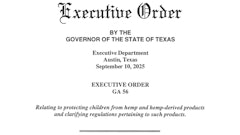Gov. Jim Justice is expected to sign SB 386 into law, making West Virginia the 29th state to adopt an effective medical marijuana law
[Press Release] CHARLESTON, W. Va. — A medical marijuana bill received final approval in the West Virginia Legislature on Thursday and is headed to the desk of Gov. Jim Justice. He has publicly expressed support for legal access to medical marijuana and is expected to sign the bill into law, making West Virginia the 29th state to adopt an effective medical marijuana law.
SB 386, introduced by Sen. Richard Ojeda (D-Logan), received initial approval from the Senate last week (28-6). The House substantially amended the bill before approving it on Tuesday (76-24). The Senate passed the new version on concurrence Wednesday afternoon (28-6), along with some minor amendments, and the House signed off on the final version Thursday (74-24).
“Some of the House amendments to the bill are concerning, but it still has the potential to provide relief to thousands of seriously ill West Virginians,” said Matt Simon of the Marijuana Policy Project (MPP), who is a West Virginia native and graduate of West Virginia University. “We commend the Legislature for passing this compassionate and much-needed legislation, and we encourage Gov. Justice to sign it into law.
“This will be an important and, in some cases, life-saving program,” Simon said. “It is critical that the state implement it promptly. We are committed to working with officials to make sure the program is as effective as possible and to get it up and running in a timely fashion. Many patients cannot afford to wait much longer.”
SB 386, titled the West Virginia Medical Cannabis Act, charges the Bureau of Public Health with regulating medical marijuana growers, processors, and dispensaries. Patients with specifically listed qualifying medical conditions will be allowed to use extracts, tinctures, and other preparations of marijuana, but not marijuana in flower or leaf form. This differs from the original version of the bill and the medical marijuana programs in most other states. A summary of SB 386 is available at http://bit.ly/2nbUAq3.
“There is nearly universal support for legalizing medical marijuana in the U.S., and it spans the political spectrum,” Simon said. “This is the third state in a row to pass a medical marijuana bill through a Republican-controlled House and Senate. Hopefully, this is a trend that will continue with some other states and at the federal level.”
A February 2017 Quinnipiac University Poll found 93% of U.S. voters think marijuana should be legal for medical purposes. Twenty-eight states, the District of Columbia, and the U.S. territories of Guam and Puerto Rico have enacted effective medical marijuana laws, and 18 states have adopted medical marijuana laws that are ineffective because they are either unworkable or exceptionally restrictive. Once S.B. 386 is signed into law, only three states in the nation — Idaho, Indiana, and Kansas — will lack any form of medical marijuana law.
The Marijuana Policy Project is the nation’s largest marijuana policy organization. For more information, visit http://www.MarijuanaPolicy.org.












.jpg?auto=format%2Ccompress&fit=crop&h=141&q=70&w=250)














